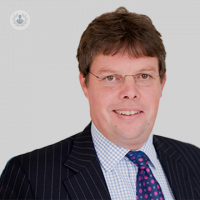What to expect: A detailed guide to radioactive iodine therapy for patients
Autore:Following surgical treatment for thyroid cancer, patients may undergo radioactive iodine therapy, also known as radioiodine therapy, to eliminate any remaining cancer cells in the area. In this expert guide to radioiodine therapy, revered consultant clinical oncologist Professor Chris Nutting explains how this form of treatment works, its success rate and what patients can expect from their time in hospital.

What is radioactive iodine therapy?
Radioactive iodine therapy is used for many patients who are being treated for thyroid cancer. Usually, the radioiodine treatment is given within a few weeks after the surgical removal of a thyroid cancer.
Radioiodine therapy requires hospitalisation, normally just for a twenty-four hour period. The purpose of the radioiodine treatment is to maximise the chance of curing a patient’s thyroid cancer. For most patients the success rates are very high, in the region of ninety per cent.
How does radioactive iodine therapy work?
Radioactive iodine treatment is a very interesting and clever treatment in some respects. Normally, we take in iodine through our diet and the thyroid gland converts it into a hormone called thyroxin. We can use that characteristic of the element to give a radioactive form of iodine which is used to treat the cancer.
The radioactive iodine is absorbed in the same way that you absorb iodine through your diet normally. Once absorbed, it reaches any residual thyroid tissue in your neck or any thyroid cancer cells left behind after the surgery. Hopefully, the radiation within the iodine will eradicate any residual tissue or cancer cells which remain.
What should patients expect from radioactive iodine therapy?
Radioiodine therapy is usually given as an in-patient treatment in the hospital. Patients typically come in to hospital on the morning of the treatment to have some blood tests done before taking the iodine. It is taken as a little capsule which patients swallow by mouth and so is very straight forward.
Once the iodine capsule has been administered, the body emits small amounts of radiation for the next few days. In the first few hours, the radiation level is quite high and therefore patients have to remain in hospital, usually just overnight. On the second day, a physicist will measure the radiation levels left in the body and as long as they are low enough for health and safety requirements, patients are able to go home. Over ninety per cent of patients are able to return home the day after their treatment.
Does radioactive iodine therapy have any side effects?
Radioactive iodine therapy is a cancer treatment which is fortunately free of most side effects. However, patients do have to be hospitalised due to the radiation which is inside their body for the first few days after treatment.
Sometimes patients say that they can taste the iodine as it comes out in their saliva (a metallic-like taste) which may last for a few hours after the administration of the treatment. Many patients say they feel a bit tired after radioiodine therapy and some feel a bit nauseated in the first few hours but this is usually very mild.
Generally speaking, the side effects of radioiodine treatment are relatively rare. The occasional patient who does feel nauseous from the treatment can be treated with standard anti-sickness medication and any tiredness usually resolves within a few days.
After discharge from the hospital on the second day, patients will be given instructions on avoiding any radiation exposure to other people (particularly young children or pregnant women) for the first four or five days following treatment. In the short term, however, there are no side effects after going home.
Is radiation iodine therapy safe?
Radiation is technically carcinogenic, which means it can possibly cause a cancer in the future. There has been a lot of discussion as to whether radiation iodine therapy increases the risk of other cancers for patients in treatment for thyroid cancer.
It’s important to remember that most patients who are receiving this treatment are young women who have a very good prognosis and may live for twenty, thirty or forty years after their initial treatment. Most of the studies which have been done don’t show a significant excess risk of the development of cancers afterwards, although theoretically this is a small risk.
What is the success rate of radioactive iodine therapy treatment?
The purpose of radioiodine treatment after thyroidectomy for people who have had thyroid cancer is to eradicate any residual thyroid tissue or thyroid cancer cells left in the area. The success rates are very good indeed.
Most patients with thyroid cancer are young women between the ages of twenty and forty years and the overall cure rates in that population is in excess of ninety per cent. In terms of the successful oblation of the thyroid tissue, the rates are very high and only about ten per cent of patients require a second treatment of radioiodine.
Professor Nutting is one of the UK’s leading consultant clinical oncologists. If you are seeking treatment for thyroid cancer and wish to book a consultation with Professor Nutting, simply visit his Top Doctors profile.


